人教版九年级英语上册期中考试卷(含听力稿和答案)
人教版九年级英语上册:期中测试卷(含答案)
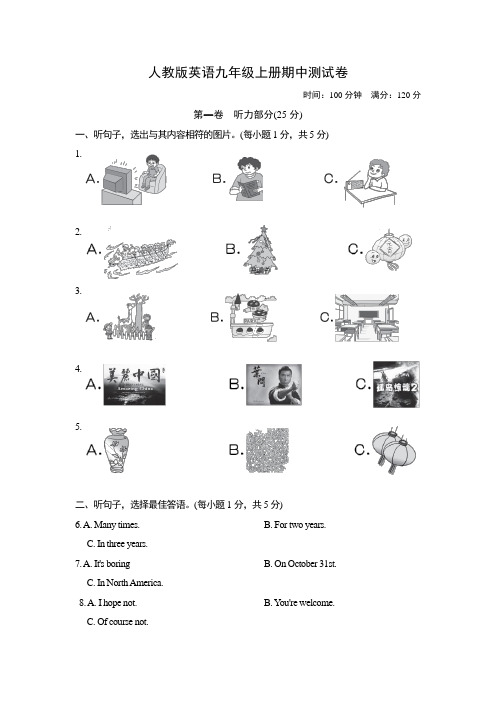
人教版英语九年级上册期中测试卷时间:100分钟满分:120分第一卷听力部分(25分)一、听句子,选出与其内容相符的图片。
(每小题1分,共5分)1.2.3.4.5.二、听句子,选择最佳答语。
(每小题1分,共5分)6. A. Many times. B. For two years.C. In three years.7. A. It's boring B. On October 31st.C. In North America.8. A. I hope not. B. Y ou're welcome.C. Of course not.9. A. He was very quiet. B. He is very funny.C. He used to walk to school.10. A. Paper. B. Mr. Zhang. C. In Weifang.三、听短对话,选择正确答案。
(每小题1分,共5分)11. What is Mike going to buy for his father?A. A tie.B. A T-shirt.C. A scarf.12. What was Bill like in the past?A. Outgoing.B. Popular.C. Quiet.13. What should the boy do?A. Join an English club.B. Find a pen friend.C. Find a partner in his class.14. Where will the woman go?A. The History Museum.B. The Art Museum.C. The Science Museum.15. What's Kate's ruler made of?A. Wood.B. Steel.C. Plastic.四、听长对话,选择最佳答案。
2024-2025学年人教版初三英语上册期中素质考试试卷及答案
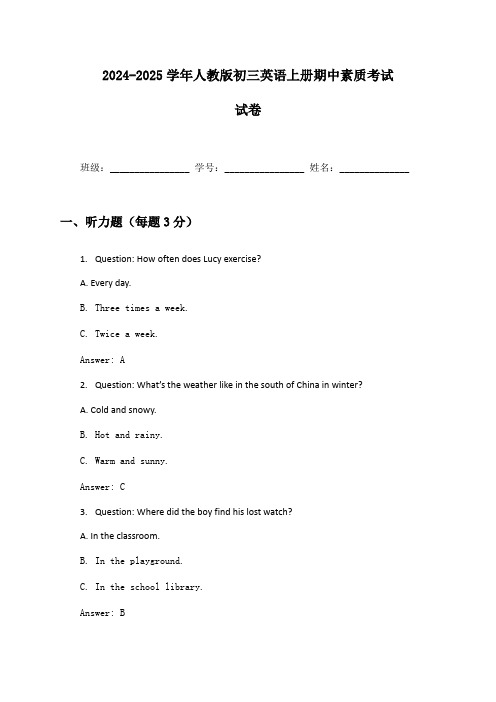
2024-2025学年人教版初三英语上册期中素质考试试卷班级:________________ 学号:________________ 姓名:______________一、听力题(每题3分)1.Question: How often does Lucy exercise?A. Every day.B. Three times a week.C. Twice a week.Answer: A2.Question: What’s the weather like in the south of China in winter?A. Cold and snowy.B. Hot and rainy.C. Warm and sunny.Answer: C3.Question: Where did the boy find his lost watch?A. In the classroom.B. In the playground.C. In the school library.Answer: B4.Question: What’s the man’s favorite subject?A. Math.B. Science.C. English.Answer: A5.Question: How much is the shirt on sale?A.10.B.20.C.30.Answer: A(Note: These are sample questions and answers. The actual test questions and answers may vary.)二、单选题(每题3分)1.—_______is the weather in your city?— It’s sunny and warm.A. WhatB. HowC. WhereD. WhyAnswer: A2.— I’m sorry for breaking your cup.— _______. It’s not expensive.A. You’re welcomeB. It’s OKC. That’s rightD. No problemAnswer: B3.The teacher asked us_______in class.A. not to talkB. not talkC. don’t talkD. not talkingAnswer: A4.She is always ready_______others.A. helpB. helpsC. to helpD. helpingAnswer: C5.—_______do you usually go to bed?— At 10:00 p.m.A. What timeB. How longC. How farD. How oftenAnswer: A三、多选题(每题4分)Question 1:Choose TWO answers that are correct.Which of the following words best describe the main character in the story?A. BraveB. LazyC. KindD. SelfishE. StubbornAnswers: A, CQuestion 2:Choose TWO answers that are grammatically correct.Which of the following sentences are correct?A. He is the tallest boy in the class.B. She like to read books in her free time.C. We goes to the movies every Friday.D. They has a big house in the countryside.E. I am writing a letter to my friend.Answers: A, EQuestion 3:Choose TWO answers that represent the correct meaning of the idiom. What does the idiom “to kill two birds with one stone” mean?A. To be efficient and accomplish two tasks at once.B. To be lazy and avoid doing work.C. To be confused and not understand something.D. To be angry and upset about something.E. To be careful and think before acting.Answers: A, E (Note: Strictly speaking, only A is the correct definition, but E could be considered a stretched interpretation due to its connotation of being smart and efficient.)Question 4:Choose TWO answers that represent the correct order of the steps in the process.What is the correct order of steps in making a sandwich?A. Spread butter on one slice of bread.B. Put the slices of bread together.C. Cut the sandwich in half.D. Add your favorite toppings.E. Toast the bread if desired.Answers: A, D, E, B, CQuestion 5:Choose TWO answers that represent the correct punctuation in the sentence. Where should the commas be placed in the following sentence?“The teacher asked the students to hand in their homework before the end of the class.”A. The teacher, asked the students to hand in their homework before the end of the class.B. The teacher asked, the students to hand in their homework before the end of the class.C. The teacher asked the students, to hand in their homework before the end of the class.D. The teacher asked the students to hand in, their homework before the end of the class.E. The teacher asked the students to hand in their homework before the end of the class.Answers: D, E (Note: E has no commas, but it is the original sentence with correct punctuation. D has a comma that is acceptable in some styles toseparate a long prepositional phrase from the rest of the sentence.)四、阅读理解(每题4分)Title: The Power of ReadingReading is a powerful tool that can open up a world of knowledge and imagination. It has the ability to transport us to faraway places, introduce us to new ideas, and help us understand the perspectives of others. Whether it’s a thrilling adventure story, athought-provoking novel, or a factual non-fiction book, reading has the potential to enrich our lives in countless ways.One of the most significant benefits of reading is its impact on our vocabulary. As we read, we encounter new words and phrases that we might not otherwise come across in daily conversation. Over time, this exposure to a wider range of vocabulary helps us communicate more effectively and express ourselves with greater precision.In addition to vocabulary, reading also enhances our critical thinking skills. As we read, we are presented with different points of view and are challenged to analyze andevaluate the information we encounter. This process of questioning and analyzing what we read helps us develop a more nuanced understanding of the world and the issues we face.Moreover, reading can be a source of comfort and solace. In times of stress orloneliness, a good book can provide a welcome distraction and a sense of escape. The characters and stories we encounter in books can offer us insights into human behavior and emotions, helping us better understand ourselves and others.Finally, reading is a lifelong pursuit that can bring joy and fulfillment to any age. Fromyoung children learning to read their first words to adults seeking to expand theirhorizons, the joy of reading is universal. It is a habit that can be cultivated and nurtured, enriching our lives with knowledge, wisdom, and understanding.Questions1.What is the main idea of the passage? (4 points)•Answer: The passage discusses the power and benefits of reading.2.What is one of the significant benefits of reading mentioned in the passage? (4points)•Answer: It impacts our vocabulary and helps us communicate more effectively.3.How does reading enhance our critical thinking skills? (4 points)•Answer: By presenting us with different points of view and challenging us to analyze and evaluate the information we encounter.4.What does reading offer in times of stress or loneliness? (4 points)•Answer: Comfort and solace. It can provide a distraction and a sense of escape.5.What is the universal joy that reading brings to people of all ages? (4 points)•Answer: The joy of reading is universal and can bring joy and fulfillment to any age.五、作文(30分)Title: The Importance of Perseverance in Overcoming ChallengesDirections: Write a composition of about 100 words on the topic “The Importance of Perseverance in Overcoming Challenges.” You should base your composition on the outline given below.Outline:1.Introduction: Define perseverance and its significance.2.Main Body:•Give examples of people who persevered and achieved success. •Explain why perseverance is crucial in overcoming challenges.3.Conclusion: Summarize the importance of perseverance and encourage readers topersevere.Sample Composition:In life, we often encounter various challenges and obstacles. To overcome these, perseverance plays a pivotal role. Perseverance is the ability to continue doingsomething despite difficulties or failure. It is a key ingredient for success.Many great individuals have demonstrated the power of perseverance. TakeThomas Edison, for instance, who persevered through thousands of failed attempts to invent the light bulb. His unwavering dedication eventually led to a momentous achievement. Similarly, athletes who persevere through rigorous training achieve remarkable results on the field.The importance of perseverance lies in its ability to transform adversity intoopportunity. It helps us stay focused and motivated, even when faced withseemingly insurmountable challenges. By persevering, we can gradually overcome obstacles and achieve our goals.In conclusion, perseverance is essential for overcoming challenges in life. It is avaluable trait that can transform our failures into successes. Therefore, let uscultivate perseverance and never give up in pursuit of our dreams.。
2023-2024学年人教版英语九年级全册期中测试卷(含答案)
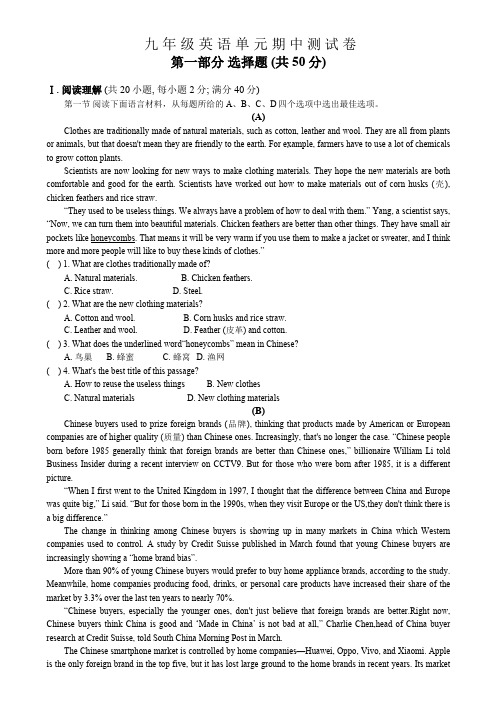
Chinese buyers think China is good and ‘Made in China’ is not bad at all,” Charlie Chen,head of China buyer
research at Credit Suisse, told South China Morning Post in March.
market by 3.3% over the last ten years to nearly 70%.
“Chinese buyers, especially the younger ones, don't just believe that foreign brands are better.Right now,
B. CCTV 9.
C. South China Morning Post.
D. Business Insider.
( ) 7. Which fact best explains “home brand bias”?
A. Apple had a market share of 54% in 2015.
increasingly showing a “home brand bias”.
More than 90% of young Chinese buyers would prefer to buy home appliance brands, according to the study.
Meanwhile, home companies producing food, drinks, or personal care products have increased their share of the
九年级上学期期中考试英语试卷含答案(人教版)

九年级上学期期中考试英语试卷含答案(人教版)九年级上学期期中考试英语试卷含答案(人教版)第一部分:听力部分(共20分)第一节:听对话回答问题(共10小题,每小题1分)1. A) In a hotel. B) In a restaurant. C) In a bookstore.2. A) At the post office. B) At the library. C) At the supermarket.3. A) On foot. B) By bus. C) By bike.4. A) A sandwich. B) A salad. C) A pizza.5. A) Tomorrow. B) Later in the day. C) Next week.6. A) Around 8:30. B) Around 9:00. C) Around 9:30.7. A) Cloudy. B) Sunny. C) Rainy.8. A) Watch a movie. B) Play basketball. C) Go shopping.9. A) A history book. B) A science book. C) A math book.10. A) In a hospital. B) In a hotel. C) In a bookstore.第二节:听对话与短文回答问题(共10小题,每小题1分)11. B) She is happy about her new job.12. A) At a clothing store.13. B) The orange dress is too expensive.14. C) Go to the library.15. A) His family.16. C) They are in different grades.17. A) Tennis.18. C) She is taking a cooking class.19. A) Three days.20. B) A science book.第二部分:选择题(共40分)单项选择(共15小题,每小题1分)21. B) watching22. A) to finish23. C) haven't eaten24. B) which25. A) studying26. C) did; leave27. B) much28. C) more carefully29. A) makes30. B) whom31. C) on32. A) dishonest33. B) sunny34. C) than35. A) best完型填空(共15小题,每小题1分)36. C) but37. B) with38. A) quickly39. D) before40. C) fun41. B) out42. D) in43. C) excitement44. A) their45. D) knows46. B) playing47. A) decided48. B) adventure49. C) greatest50. A) finally阅读理解(共10小题,每小题1分)51. C) studying hard52. B) because he wants to be a doctor53. A) confident54. C) bored55. B) for 3 years第三部分:写作(共20分)请根据以下提示完成一篇英语短文:提示:假如你是李华,你校开展了"科技对人类的贡献"的主题班会,要求一名同学进行发言,请你根据以下内容,写一篇发言稿。
人教版九年级英语上册期中考试卷(含听力稿和答案)

梁子湖区2020年秋期中质量监测九年级英语温馨提示:1、试卷共四个部分、七大题。
考试时间120分钟,满分120分。
2、听力与选择题的答案,用2B铅笔在答题卡上指定位置将答案标号涂黑。
如需改动,用橡皮擦干净后,再选涂其它答案标号。
答在试卷上无效。
3、非选择题的答案(含56—65小题)用黑色中性笔直接在答题卡上作答。
第一部分听力测试Ⅰ. 听力测试(共三节,20小题,满分25分)第一节: 听对话或描述,选图画。
听下面三段对话和两段描述。
从A、B、C 三幅图选出正确的一幅。
每段材料仅读一遍。
(每小题1分,共5分)1. 2. 3. 4. 5.A B C A B C A B C A B C A B C英语试卷第 1 页(共12 页)第二节:听对话,选答案。
听下面4段对话,根据对话内容,从A、B、C三个选项中选出最适当的答案。
每段对话读两遍。
(每小题1分,共10分)听第6段材料,完成6—7小题。
6. Where is Daisy at the moment?A. In the school.B. On a bus.C. At a bus stop.7. How might Daisy go home?A. By taxi.B. By car.C. On foot.听第7段材料,完成8—10小题。
8. Where was the camera made?A. In America.B. In Japan.C. In Africa.9. What present did Thomas give Steve?A. A video.B. A book.C. A sweater.10. What does t he man think of Amy’s present?A. Expensive.B. Lovely.C. Disappointing.听第8段材料,完成11—12小题。
11. Where did Roy work?A. At a university.B. At a bank.C. At a police station.12. How did the woman know Roy?A. They were neighbors.B. They went to the same school.C. They used to play tennis together.听第9段材料,完成13—15小题。
2024年全新初三英语上册期中试卷及答案(人教版)

2024年全新初三英语上册期中试卷及答案(人教版)一、听力部分(共20分)1. 听录音,选择正确的图片。
(每小题1分,共5分)(1)A. B. C. D.(2)A. B. C. D.(3)A. B. C. D.(4)A. B. C. D.(5)A. B. C. D.2. 听录音,选择正确的答案。
(每小题1分,共5分)(1)A. B. C. D.(2)A. B. C. D.(3)A. B. C. D.(4)A. B. C. D.(5)A. B. C. D.3. 听录音,填入正确的单词。
(每小题1分,共5分)(1)My name is ______.(2)I am ______ years old.(3)I like ______.(4)I have a ______.(5)My mother is a ______.4. 听录音,回答问题。
(每小题1分,共5分)(1)What's your name?(2)How old are you?(3)What's your favorite food?(4)Do you have a pet?(5)What does your father do?二、阅读理解(共20分)1. 阅读下面的短文,选择正确的答案。
(每小题2分,共10分)Once upon a time, there was a little boy named Tom. He lived in a small village with his family. Tom was a very kind and helpful boy. He always helped his parents with their work and played with his friends in the village.One day, Tom found a lost puppy in the forest. He tookthe puppy home and took care of it. He named the puppy "Lucky" because it was lucky to be found him. Lucky became Tom's best friend, and they spent a lot of time together.One day, Tom and Lucky were playing in the forest whenthey found a lost girl. The girl was crying because she was lost. Tom and Lucky helped the girl find her way back home. The girl's parents were very thankful to Tom and Lucky.From that day on, Tom and Lucky became famous in the village. They were known as the "Heroes of the Forest". And they lived happily ever after.(1)What is the main idea of the story?A. Tom found a lost puppy and took care of it.B. Tom and Lucky helped a lost girl find her way home.C. Tom and Lucky became famous in the village.D. Tom and his family moved to another village.(2)What did Tom do when he found the lost puppy?A. He left the puppy in the forest.B. He took the puppy home and took care of it.C. He gave the puppy to his friend.D. He sold the puppy to a rich man.(3)Why did Tom name the puppy "Lucky"?A. Because the puppy was lucky to be found him.B. Because the puppy was lucky to have a new home.C. Because the puppy was lucky to have a new friend.D. Because the puppy was lucky to have a new family.(4)How did Tom feel when his family had to move to another village?A. He was happy because he could visit Lucky every weekend.B. He was sad because he had to leave Lucky behind.C. He was excited because he could make new friends in the new village.D. He was angry because he had to leave his old friends behind.(5)What did Tom and Lucky do when they found the lost girl?A. They left the girl in the forest.B. They helped the girl find her way back home.C. They took the girl to their home.D. They sold the girl to a rich man.2. 阅读下面的短文,回答问题。
2024年人教版九年级英语上册期中考试卷(附答案)

2024年人教版九年级英语上册期中考试卷(附答案)一、选择题:5道(每题1分,共5分)1. Which of the following is a correct way to ask for permission in English?A. Can I go to the bathroom?B. I want to go to the bathroom.C. May I use the bathroom?D. I need to go to the bathroom.2. Which of the following is a correct way to respond to an invitation in English?A. Yes, I'd love to.B. No, I don't like to.C. I'm not sure.D. I'm busy.3. Which of the following is a correct way to apologize in English?A. I'm sorry, it's not my fault.B. I apologize for being late.C. It's okay, don't worry about it.D. I'm sorry, but I can't help it.4. Which of the following is a correct way to express gratitude in English?A. Thank you very much.B. I don't like it.C. It's not a problem.D. I don't need it.5. Which of the following is a correct way to introduce yourself in English?A. My name is John, and I'm from China.B. I'm John, and I'm from China.C. My name is John, I'm from China.D. I'm John from China.二、判断题5道(每题1分,共5分)1. It is polite to interrupt someone when they are speaking. ( )2. It is impolite to say "no" directly. ( )3. It is important to maintain eye contact when speaking to someone. ( )4. It is okay to use slang words in formal situations. ( )5. It is polite to ask someone to repeat what they saidif you don't understand. ( )三、填空题5道(每题1分,共5分)1. When you want to ask for permission, you can say"______" or "______".2. When you want to apologize, you can say "______" or "______".3. When you want to express gratitude, you can say"______" or "______".4. When you want to introduce yourself, you can say"______" or "______".5. When you want to respond to an invitation, you can say "______" or "______".四、简答题5道(每题2分,共10分)1. Please describe a situation where you would need to ask for permission in English.2. Please describe a situation where you would need to apologize in English.3. Please describe a situation where you would need to express gratitude in English.4. Please describe a situation where you would need to introduce yourself in English.5. Please describe a situation where you would need to respond to an invitation in English.五、应用题:5道(每题2分,共10分)1. Write a short dialogue between two people asking for permission to leave the room.2. Write a short dialogue between two people apologizing for being late.3. Write a short dialogue between two people expressing gratitude for a gift.4. Write a short dialogue between two people introducing themselves at a party.5. Write a short dialogue between two people responding to an invitation to a movie.六、分析题:2道(每题5分,共10分)2. Compare and contrast the differences between formal and informal language.七、实践操作题:2道(每题5分,共10分)1. Roleplay a situation where you need to ask for permission to leave the room.2. Roleplay a situation where you need to apologize for breaking someone's glasses.答案:一、选择题1. C2. A3. B4. A5. B二、判断题1. ×2. √3. √4. ×5. √三、填空题1. May I; Can I2. I'm sorry; I apologize3. Thank you; I appreciate it4. My name is; I'm5. Yes, I'd love to; I'd be happy to四、简答题1. Situation: You are in a classroom and you need to leave the room to go to the bathroom.2. Situation: You are late for a meeting and you need to apologize to your boss.3. Situation: Someone has given you a gift and you want to express your gratitude.4. Situation: You are at a party and you want to introduce yourself to someone new.5. Situation: Your friend has invited you to go to a movie and you want to respond to the invitation.五、应用题1. Dialogue:A: Excuse me, may I leave the room for a moment?B: Sure, go ahead.2. Dialogue:A: I'm sorry I'm late. I apologize for the inconvenience.B: It's okay, don't worry about it.3. Dialogue:A: Thank you so much for the gift. I appreciate it.4. Dialogue:A: Hi, I'm John. I'm from China.B: Nice to meet you, John. I'm Mary.5. Dialogue:A: Thanks for inviting me to the movie. I'd love to go.B: Great, I'll pick you up at 7 PM.六、分析题七、实践操作题1. Roleplay:A: Excuse me, may I leave the room for a moment?B: Sure, go ahead.2. Roleplay:A: I'm sorry I broke your glasses. I apologize for the inconvenience.B: It's okay, don't worry about it.八、专业设计题:5道(每题2分,共10分)1. Design a poster to promote a school event, such as a sports day or a cultural festival. Include all necessary information and use appropriate colors and fonts.2. Create a short story in English that includes at least three characters, a setting, and a conflict. The story should be between 100200 words long.3. Design a worksheet for a language arts class that focuses on vocabulary building. Include a variety of exercises, such as matching, fillintheblanks, and word searches.4. Create a dialogue between two characters in a playthat is set in a historical period. The dialogue should reflect the language and social customs of that time.5. Design a board game that teaches basic English grammar concepts, such as nouns, verbs, and adjectives. Include instructions, game pieces, and a game board.九、概念解释题:5道(每题2分,共10分)1. Define the term "figurative language" and provide an example of its use in a sentence.2. Explain the difference between "active voice" and "passive voice" in writing.3. Describe the concept of "context clues" and how they can be used to determine the meaning of unknown words.4. Define the term "alliteration" and provide an example of its use in a poem.5. Explain the purpose of using "transition words" in writing and provide an example of their use in a paragraph.十、思考题:5道(每题2分,共10分)1. How can you use your knowledge of English grammar to improve your writing skills?2. What strategies can you use to expand your vocabulary in English?4. What role does reading play in improving your English language skills?5. How can you use your knowledge of English to connect with people from different cultures?十一、社会扩展题:5道(每题3分,共15分)1. Research a famous Englishspeaking author and write a short biography about their life and works.2. Explore the impact of social media on language learning and discuss both the positive and negative aspects.3. Investigate the history of the English language and its development over time.4. Compare and contrast the education systems in different Englishspeaking countries.一、选择题1. C2. A3. B4. A5. B二、判断题1. ×2. √3. √4. ×5. √三、填空题1. May I; Can I2. I'm sorry; I apologize3. Thank you; I appreciate it4. My name is; I'm5. Yes, I'd love to; I'd be happy to四、简答题1. Situation: You are in a classroom and you need to leave the room to go to the bathroom.2. Situation: You are late for a meeting and you need to apologize to your boss.3. Situation: Someone has given you a gift and you want to express your gratitude.4. Situation: You are at a party and you want to introduce yourself to someone new.5. Situation: Your friend has invited you to go to a movie and you want to respond to the invitation.五、应用题1. Dialogue:A: Excuse me, may I leave the room for a moment?B: Sure, go ahead.2. Dialogue:A: I'm sorry I'm late. I apologize for the inconvenience.B: It's okay, don't worry about it.3. Dialogue:A: Thank you so much for the gift. I appreciate it.4. Dialogue:A: Hi, I'm John. I'm from China.B: Nice to meet you, John. I'm Mary.5. Dialogue:A: Thanks for inviting me to the movie. I'd love to go.B: Great, I'll pick you up at 7 PM.六、分析题七、实践操作题1. Roleplay:A: Excuse me, may I leave the room for a moment?B: Sure, go ahead.2. Roleplay:A: I'm sorry I broke your glasses. I apologize for the inconvenience.B: It's okay, don't worry about it.一、选择题:考察学生对基本礼貌用语的理解和应用能力。
人教版九年级英语上册期中达标测试卷含答案

人教版九年级英语上册期中达标测试卷第一部分听力I. 听句子,选出句子中所包含的信息(共5小题;每小题1分,满分5分)( ) 1. A. correct B. caringC. careful( ) 2. A. an English test B. a surprise partyC. a sports club( ) 3. A. take out B. hang outC. put out( ) 4. A. Tom likes drawing pictures after supper.B. Tom is used to drawing pictures after supper.C. Tom doesn’t draw pictures after supper now.( ) 5. A. She is a star on the stage.B. She acts so well that she looks like a star.C. She looks so beautiful that she looks like a star.II. 听句子,选出该句的最佳答语(共5小题;每小题1分,满分5分)( ) 6. A. Have a good time. B. Help yourself.C. Excuse me.( ) 7. A. It’s nothing. B. Sorry, I’m late.C. Sure, here you are.( ) 8. A. You’re welcome. B. Thank you.C. Not at all.( ) 9. A. You’d better not. B. So rry, I won’t.C. Yes, thanks.( ) 10. A. It’s mine. B. It is late.C. It’s wonderful.III. 听对话和问题,选择正确答案(共8小题;每小题1分,满分8分)( ) 11. What was the weather like on Tina’s holiday?( ) 12. What’s Jason going to do?( ) 13. What is the blouse made of?A. Cotton.B. Silk.C. Wool. ( ) 14. Where did she buy it?A. In China.B. In Japan.C. In the U. S. ( ) 15. What season is it now?A. Summer.B. Autumn.C. Winter. ( ) 16. Why wouldn’t the woman like to go to the cinema?A. Because she is tired.B. Because she has seen the movie.C. Because she is ill.( ) 17. What will they do this Saturday?A. They will go swimming.B. They will have some seafood.C. They will go to the park.( ) 18. When will they meet?A. At 4 pm.B. At 5 pm.C. At 6 pm. IV. 听短文和问题,选择正确答案(共7小题;每小题1分,满分7分)( ) 19. When will Flight FA 320 take off?A. In 10 minutes.B. In 15 minutes.C. In 20 minutes.( ) 20. Where is Flight BA 958 going?A. To London.B. To New York.C. To Sydney. ( ) 21. What did Ms. Rowling lose?A. An ID card.B. A handbag.C. A coat.( ) 22. What does the writer want to teach us?A. To be a good guest in China.B. To be a good guest in America.C. To be a good guest in Australia.( ) 23. What is the first step?A. Arrive at the house on time.B. Help with the clean-up.C. Reply to an invitation.( ) 24. What should you bring to be a good guest?A. A bottle of wine.B. An invitation.C. A friend.( ) 25. Why should you offer to help?A. Because it will be fun.B. Because it will be interesting.C. Because it will be polite.V. 听短文填空(共5小题;每小题1分,满分5分)第二部分语言运用VI. 完形填空(共15小题;每小题1分,满分15分)The horse-face skirt, or mamianqun in Chinese holds a very unique position in China’s 31 ________clothing culture. This skirt can gi ve us a taste of the 32________ of ancient Chinese clothing. In the General History of Chinese Clothing, thehorse-face skirt is 33________ as follows, “There are folds(褶)on both sides; the skirt door and back are 34 ________with patterns(图案), and there is the skirt waist and lace(系带)upon it.”The horse-face skirt 35________ appeared in the Song Dynasty and grew popular during the Ming Dynasty, from the royal family 36________ ordinary people. 37________ , according to different celebrations, the material, pattern and color of horse-face skirts were also 38________ .The horse-face skirt in the Ming Dynasty was simple in 39________ and pattern. In the Qing Dynasty, the horse-face skirt gradually became elegant(精美的). The colors became richer and patterns became more and more colorful, 40 ________the outer skirt door. People added many good symbolic patterns on the outer skirt door, 41 ________flowers, birds and butterflies. Besides, this overlapping(重叠的)design leaves openings(留下开口)in the 42 ________and back of the skirt, making 43________very suitable for horse-riding.In the 44 ________of experts and people in the fashion industry, traditional Chinese clothing, represented by the horse-face skirt, is an important symbol of Chinese civilization 45 ________has influenced Western fashion for many years. ( ) 31. A. now B. traditionalC. modernD. past( ) 32. A. beauty B. differenceC. amazementD. symbols( ) 33. A. read B. writtenC. describedD. said( ) 34. A. seen B. usedC. pointedD. decorated( ) 35. A. final B. secondC. firstD. one( ) 36. A. at B. inC. onD. to( ) 37. A. So B. HoweverC. ButD. Though( ) 38. A. the same B. alikeC. differentD. ordinary( ) 39. A. shape B. materialC. styleD. color( ) 40. A. especially B. speciallyC. exactlyD. hardly( ) 41. A. for example B. likeC. asD. with( ) 42. A. top B. leftC. rightD. front( ) 43. A. it B. himC. themD. that( ) 44. A. noses B. mouthsC. carsD. eyes( ) 45. A. that B. whoC. whatD. whereVII. 短文填空(共10小题;每小题1分,满分10分)阅读下面短文, 在空白处填入一个适当的单词(有提示词的,填入所给单词的正确形式)。
(完整版)人教版九年级英语上册期中考试试题及答案,推荐文档

人教版九年级英语上册期中考试试卷第一部分听力部分一、听力(本题有15 小题。
第一节每小题1 分。
第二、第三节每小题2 分。
共25 分。
)第一节:听小对话,从A 、B、C 三个选项中选择符合对话内容的图片。
1.A. B. C.2.A. B. C.3.A. B. C.4.A. B. C.5.A. B. C.6.What would Lucy like?A.Apples.B. Pears.C. Oranges.7.How much is the red T-shirt?A. $15.B. $20.C. $25.8.Who is the tallest of the three?A.Mary.B. Tom.C. Susan.9.What does the woman speaker do?A.A teacher.B. A doctor.C. A policewoman.10.How long has Mrs Green had the watch?A.More than three years.B. Less than three years.C. Just three years. 第三节:听短文,根据短文内容,完成表格。
()12. A. friend ()13. A. watch B. teacherB. rememberC. classmateC. understand()14. A. make B. play C. learn()15. A. some B. little第二部分C. most笔试部分二、单项填空(本题有15 小题,每小题1 分,共15 分)16.--- How do you study a test?--- I study working a group.A. for, in, withB. for, by, atC. for, by, withD. of, in, by17.--- Hey! Don’t you remember me?--- Wow! Paula? You used to curly hair.A.beB. areC. haveD. has18.Sixteen-years-olds shouldn’t to go to an Internet bar.A.be allowedB. be allowC. allowD. are allowed19.-– Do you feel tired?--- No, I don’t. If I were tired, I a rest.A hadB would haveC will haveD have20.--- Tom, where is your father?--- I’m not sure. He in his office.A.isB. may beC. maybeD. may21.I don’t like people talk much but do little.A.whoB. thatC. whichD. whose22.---Where would you like to go ?---I’d like to go .A.warm somewhereB. place warmC. somewhere warmD. warm place23.---You look so , don't you?--- Yes, I've got a birthday p resent.A.sadB. happyC. tiredD. worried24.---Mom, is my MP4?---I put it in your backpack.A.whatB. howC. whoseD. where25.---I’m not hungry but thirsty.---A.I’m hungry, too.B. What about some cakes?C. I’m happy to hear that.D. How about a glass of water?26.—are you talking about?—The Olympic Games in Beijing.A.WhatB. WhomC. HowD. Where27.---Why not come and join us in the game?--- . But I must meet Mr Smith at his office now..A.I’d like to .B. Let’s goC. Yes,pleaseD. No, problem.28.— My clock doesn’t.— Let me have a look. Maybe I can help you.A.workB. stopC. openD. answer29.— We can use QQ to talk with each other online.— Really? Could you please show me it?A.what to doB. how to doC. when to doD. why to do30.In which of the following places can you often see this sign?A.In a park.B. In a school.C. In a science museum.D. In a street.三、完形填空(本题有15 小题,每小题1 分,共15 分)“What’s the matter, mum?”As soon as I enter the door, I find that my mother is 31 . It’s unusual –she usually32 the door and welcomes me with a smile!“She’s dying,” mum says sadly.I 33 what she says. The tulip (郁金香),mother’s34is dying.A month ago, we moved 35 our new house and mum bought a very beautiful tulip. Mum liked it very much. 36 she was free, she would sit 37 her armchair beside the tulip and enjoys its beautiful color 38 inviting smell.She treated it like a baby and looked after it 39 . She put the tulip by window and moved it from one place to 40 to give the tulip enough sunshine. The first thing she did when she41 every morning was 42 the tulip, Mum also fertilized(施肥)it many times.She hoped that with great care, the tulip would become more and more beautiful a nd 43 .But the tulip was dying 44 too much sunshine, water and fertilizer.It’s true that mother loved the tulip. But this kind of love 45 be harmful(有害的).Love can sometimes kill what you love.31.A.happy B.unhappy C.pleased D.pleasure32.A.coses B.opens C.keeps D.takes33.A.know B.love C.think D.find34.A.favourite B.hate C.unlike D.like35.A.into B.around C.across D.with36.A.Though B.Because C.After D.Wherever37.A.at B.in C.on D.under38.A.but B.and C.for D.or39.A.happily B.brightly C.carefully ually40.A.other B.place C.two places D.another41.A.got up B.made the bed C.played piano D.washed her face42.A.to take B.to cut C.to water D.to pull43.A.dry B.strong C.wet D.old44.A.because B.for C.since D.because of45.A.must B.should C.can D.need四、阅读理解(本题有15 小题,每小题2 分。
2024年人教英语九年级上期中测试卷
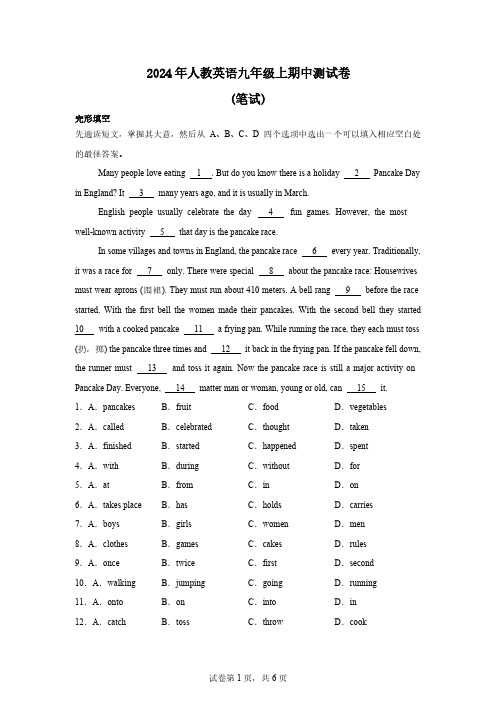
2024年人教英语九年级上期中测试卷(笔试)完形填空先通读短文,掌握其大意,然后从A、B、C、D 四个选项中选出一个可以填入相应空白处的最佳答案。
Many people love eating 1 . But do you know there is a holiday 2 Pancake Day in England? It 3 many years ago, and it is usually in March.English people usually celebrate the day 4 fun games. However, the most well-known activity 5 that day is the pancake race.In some villages and towns in England, the pancake race 6 every year. Traditionally, it was a race for 7 only. There were special 8 about the pancake race: Housewives must wear aprons (围裙). They must run about 410 meters. A bell rang 9 before the race started. With the first bell the women made their pancakes. With the second bell they started 10 with a cooked pancake 11 a frying pan. While running the race, they each must toss (扔,掷) the pancake three times and 12 it back in the frying pan. If the pancake fell down, the runner must 13 and toss it again. Now the pancake race is still a major activity on Pancake Day. Everyone, 14 matter man or woman, young or old, can 15 it. 1.A.pancakes B.fruit C.food D.vegetables 2.A.called B.celebrated C.thought D.taken 3.A.finished B.started C.happened D.spent4.A.with B.during C.without D.for5.A.at B.from C.in D.on6.A.takes place B.has C.holds D.carries 7.A.boys B.girls C.women D.men 8.A.clothes B.games C.cakes D.rules 9.A.once B.twice C.first D.second 10.A.walking B.jumping C.going D.running 11.A.onto B.on C.into D.in12.A.catch B.toss C.throw D.cook13.A.throw it away B.pick it up C.give it up D.eat it up 14.A.nothing B.no C.not D.none 15.A.feel sorry about B.be afraid of C.be scared of D.get fun from阅读理解(A)In China, December of the lunar calendar (农历) is called the La month, the start of the Spring Festival.On this day, people eat a special hot rice porridge —Laba Zhou. On the night before the festival, people will begin to cook the porridge and make a lot of preparations. However, it is a dessert (甜品) with sugar. In the South, it is a kind of salty porridge with vegetables and meat.There is an interesting story about Laba Zhou. A man threw away a lot of food. People around him felt it was such a waste, so they collected the food that he threw away, such as beans and rice. At the end of the year, the man learned a meaningful lesson.And there is one more traditional food on the Laba Festival—Laba Garlic (大蒜). People will peel garlic and put it in the vinegar (醋). Day after day, people can taste the garlic while eating dumplings!16.Laba Festival is the __________.A.ending of the springB.beginning of the springC.ending of the Spring FestivalD.beginning of the Spring Festival17.What does the underline word “it” in paragraph 2 refer (指代) to?A.The rice.B.The vegetable.C.The porridge.D.The dumpling.18.What would the man probably do after learning the lesson?A.Save food.B.Peel garlic.C.Eat Laba Zhou.D.Learn to cook.19.According to the text, what makes garlic taste special?A.Vinegar.B.Salt.C.Sugar.D.Water.20.In which part of a magazine can we read this text?A.Science.B.Culture.C.Art.D.Sports.(B)He was there every morning, sitting motionless (面无表情的) on the front steps of his house. Each morning I walked this road with my daughter to her kindergarten class. We were new to the neighborhood so that I didn’t know many of my neighbors. On one beautiful autumn morning, as we passed his house, my daughter called out to him, “Hi, Mr. Man!” Always the outgoing child, I wasn’t surprised at her enthusiasm (热情). But her cheerfulness soon faded (消退) when the man didn’t look at her or say “Hi” back.As we continued on our walk to school, my daughter asked why the man didn’t want to say hi to her. Because I didn’t have an answer, I said simply, “May be he is having a bad day.” Later I knew that Bob lost his wife in a car accident.A few days later, as we approached Bob’s house on our way to school, my daughter called out “Hi, Mr. Man!” and as usual, he didn’t respond. But then she ran onto his front lawn and picked up a beautiful red autumn leaf. She continued up one step and handed it to him. I held my breath.As she skipped back to me, she said, “See you tomorrow, Mr. Man!” This time, he acknowledged (搭理) her. In a soft gentle voice, he thanked her and said, “See you tomorrow.”From then on, Bob and my daughter exchanged greeting each morning. Our friendship with Bob continued for many years. But the sweetest day is when Bob attended my daughter’s high school graduation. Bob gave my daughter a gift—a book on identifying (识别) various plants and trees. There, tucked in the pages that described an oak tree, was the leaf my daughter had given to Mr. Man when they first met. He had dried and pressed it and kept it all those years.21.What puzzled the girl?A.The cause of the man’s sadness.B.The shadows in the man’s eyes.C.The man’s sitting still on the steps.D.The man’s not answering her greeting. 22.How did the author feel when his daughter gave the red leaf to the man?A.Proud.B.Nervous.C.Embarrassed.D.Comfortable. 23.What made the gift so special according to the passage?A.A book on plants and trees.B.The leaf from the girl in the book.C.The time of high school graduation.D.A book from best friend Bob.24.Why did Bob keep that little red leaf?A.It was a care from a girl.B.It was a symbol of enthusiasm.C.It was a reminder of his painful days.D.It represented the knowledge of trees. 25.Which of the following can be the best title for the text?A.A Simple Red Leaf B.A Strange Neighbor C.An Unusual FriendD.A Greeting From a girl(C)If you put your history notes under your pillow (枕头) and sleep on them the night before an exam, will you do any better in the exam? Most of us have hoped this may help. However, knowledge can’t go through the pillow into your brain. But that doesn’t mean you can’t learn while you are asleep.Scientists aren’t exactly sure how it works, but they have discovered that the brain can learn things during sleeping hours.In one experiment (实验), researchers gave German speakers some Dutch words to learn. Then, they divided them into three groups. The researchers played the Dutch words for people in Group 1 while they were asleep, without telling these German speakers what they were doing. The sound was low so it didn’t wake them up, and only the newly introduced words were used.Another group listened to the same words while they were awake. The researchers found the people in Group 1 were better able to identify (识别) and translate (翻译) the words later. This was true only for the words that were played while they slept. The third group listened to the words when they walked. The walkers didn’t have the same success in remembering the words as the sleeping group.The researchers later found that people had more slow-wave brain activities all over the night. They said that more slow waves made people have a better memory for the new words. 26.When did the researchers play foreign words for people in Group 1 in the experiment?A.Before they went for a walk.B.Before they went to bed.C.When they were asleep.D.When they were having dinner.27.What does the underlined word “them” refer to in Paragraph 3?A.Dutch words.B.German speakers.C.Dutch speakers.D.German words.28.The last two paragraphs tell us the experiment’s ________.A.result B.reason C.influence D.purpose 29.What can we learn from the passage?A.Scientists think people can’t learn during sleeping hours.B.German speakers enjoy learning Dutch words.C.Slow-wave brain activities can help people have a good sleep.D.People in Group 3 didn’t remember the words as well as those in Group 1.30.Where is the passage most probably from?A.A history textbook.B.A science magazine.C.A travel newspaper.D.A modern novel.阅读短文,从方框中选出合适的句子填入文中,使短文完整、通顺。
人教版九年级英语上册期中测试卷(含答案和听力原文,无音频)
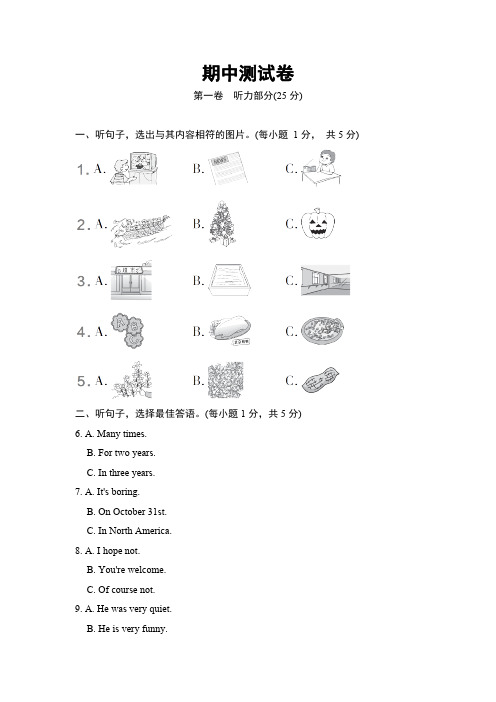
期中测试卷第一卷 听力部分(25分)一、听句子,选出与其内容相符的图片。
(每小题1分,共5分)二、听句子,选择最佳答语。
(每小题1分,共5分)6. A. Many times.B. For two years.C. In three years.7. A. It's boring.B. On October 31st.C. In North America.8. A. I hope not.B. You're welcome.C. Of course not.9. A. He was very quiet.B. He is very funny.C. He used to walk to school.10. A. Paper. B. Mr. Zhang.C. In Weifang.三、听短对话,选择正确答案。
(每小题1分,共5分)11. What does Mr. Li think the best present for him is?A. The cards.B. The flowers.C. The students' hard work.12. What did the girl use to be afraid of?A. Dogs.B. Snakes.C. Cats.13. What does the woman think of learning English by watching videos?A. Difficult.B. Interesting.C. Useless.14. Where is the man going?A. To the bank.B. To the park.C. To the library.15. Where was the earring made?A. In Thailand.B. In Japan.C. In China.四、听长对话,选择最佳答案。
2023-2024学年全国初三上英语人教版期中试卷(含答案解析)
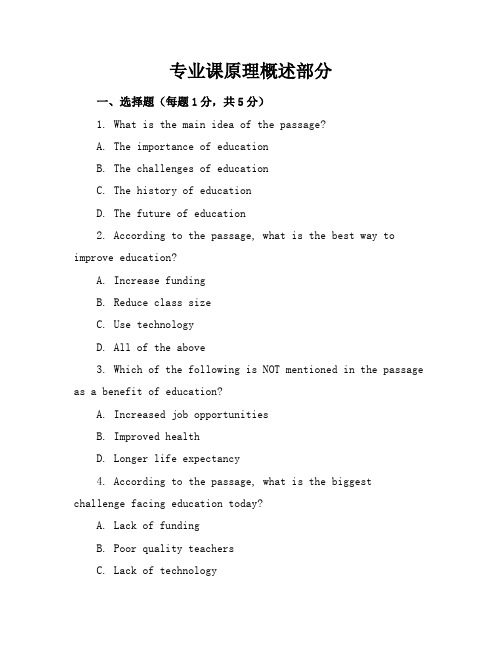
专业课原理概述部分一、选择题(每题1分,共5分)1. What is the main idea of the passage?A. The importance of educationB. The challenges of educationC. The history of educationD. The future of education2. According to the passage, what is the best way to improve education?A. Increase fundingB. Reduce class sizeC. Use technologyD. All of the above3. Which of the following is NOT mentioned in the passage as a benefit of education?A. Increased job opportunitiesB. Improved healthD. Longer life expectancy4. According to the passage, what is the biggest challenge facing education today?A. Lack of fundingB. Poor quality teachersC. Lack of technologyD. Low student motivation5. What is the author's opinion on the future of education?A. OptimisticB. PessimisticC. NeutralD. Unclear二、判断题(每题1分,共5分)1. Education is the key to success in life. (√)2. All countries have equal access to education. (×)3. Technology has no impact on education. (×)4. Education is only important for children. (×)5. The quality of education is improving worldwide. (√)三、填空题(每题1分,共5分)1. The passage discusses the _______ of education.2. According to the passage, education can lead to_______ job opportunities.3. The biggest challenge facing education today is_______.4. The author believes that the future of education is _______.5. The passage mentions that education can improve_______.四、简答题(每题2分,共10分)1. What are the benefits of education according to the passage?2. What are the challenges of education according to the passage?3. What is the author's opinion on the use of technology in education?4. How does education affect job opportunities according to the passage?5. What is the author's opinion on the future of education?五、应用题(每题2分,共10分)1. According to the passage, what is the best way to improve education? Explain your answer.2. How does education affect health according to the passage? Explain your answer.3. What are the challenges of education in your country? How can these challenges be addressed?4. How can technology be used to improve education according to the passage? Give an example.5. What is the author's opinion on the future of education? Do you agree or disagree? Explain your answer.六、分析题(每题5分,共10分)1. Analyze the author's argument in the passage. What evidence does the author provide to support their claims?2. Compare and contrast the benefits and challenges of education according to the passage. What are the similarities and differences?七、实践操作题(每题5分,共10分)1. Create a chart that summarizes the benefits of education according to the passage.2. Write a short essay on the future of education based on the information in the passage.八、专业设计题(每题2分,共10分)1. Design a lesson plan for teaching the benefits of education to a group of students.2. Create a poster that promotes the importance of education in society.3. Write a short story that illustrates the challenges of education in a developing country.4. Design a questionnaire to gather data on students' attitudes towards education.5. Create a presentation that explains the impact of technology on education.九、概念解释题(每题2分,共10分)1. Define the term "education" and explain its purpose.2. Explain the concept of "formal education" and how it differs from "informal education."3. Define the term "curriculum" and explain its role in education.4. Explain the concept of "assessment" in education and its importance.5. Define the term "inclusive education" and explain its significance.十、思考题(每题2分,共10分)1. How can we ensure equal access to education for all students?2. What are the potential drawbacks of using technology in education?3. How can we address the issue of teacher shortage in underdeveloped regions?4. What role does parental involvement play in a child's education?5. How can we measure the effectiveness of education?十一、社会扩展题(每题3分,共15分)1. Discuss the impact of education on economic development in a country.2. Analyze the correlation between education and social mobility.3. Explore the relationship between education and environmental sustainability.4. Discuss the role of education in promoting peace and reducing conflict.5. Examine the impact of globalization on education systems worldwide.一、选择题答案:1. A2. D3. B4. B5. A二、判断题答案:1. √2. ×3. ×4. ×5. √三、填空题答案:1. benefits2. increased3. Lack of funding4.optimistic 5. health四、简答题答案:2. The challenges of education include lack of funding, poor quality teachers, lack of technology, and low student motivation.3. The author believes that technology can be a valuable tool in education, but it should be used as a supplement to traditional teaching methods.4. Education can improve job opportunities providing students with the knowledge and skills needed to succeed inthe workforce.5. The author is optimistic about the future of education, believing that advancements in technology and increasedglobal awareness will lead to improved educational opportunities worldwide.五、应用题答案:2. Education can improve health providing students with knowledge about nutrition, exercise, and hygiene.3. The challenges of education in underdeveloped regions can be addressed improving infrastructure, providing teacher training programs, and increasing government investment in education.4. Technology can be used to improve education providing access to online resources, facilitating distance learning, and enhancing interactive learning experiences.5. The author is optimistic about the future of education, but I disagree. I believe that the challenges of education, such as access and quality, will continue to be significant obstacles.六、分析题答案:1. The author's argument in the passage is supported evidence such as statistical data on the benefits ofeducation and case studies of successful educational initiatives.七、实践操作题答案:2. A short essay on the future of education could discuss the potential impact of technology, the need for globalcollaboration, and the importance of addressing the challenges of education to ensure equal opportunities for all students.2. The challenges of education: lack of funding, poor quality teachers, lack of technology, and low student motivation.3. The role of technology in education: enhancing interactive learning experiences, providing access to online resources, and facilitating distance learning.5. The impact of education on economic development: providing a skilled workforce, promoting innovation and entrepreneurship, and attracting investment.各题型所考察学生的知识点详解及示例:一、选择题:考察学生对教育基础知识的掌握程度,如教育的好处、挑战等。
(人教版)初中英语九年级上册 期中测试试卷03及答案
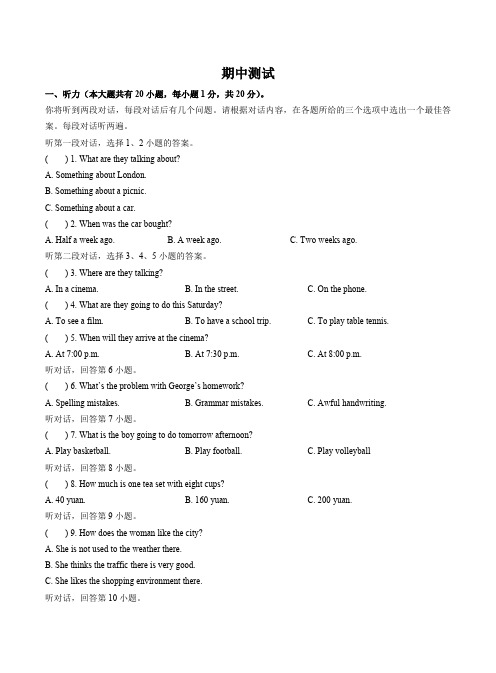
期中测试一、听力(本大题共有20小题,每小题1分,共20分)。
你将听到两段对话,每段对话后有几个问题。
请根据对话内容,在各题所给的三个选项中选出一个最佳答案。
每段对话听两遍。
听第一段对话,选择1、2小题的答案。
( ) 1. What are they talking about?A. Something about London.B. Something about a picnic.C. Something about a car.( ) 2. When was the car bought?A. Half a week ago.B. A week ago.C. Two weeks ago.听第二段对话,选择3、4、5小题的答案。
( ) 3. Where are they talking?A. In a cinema.B. In the street.C. On the phone.( ) 4. What are they going to do this Saturday?A. To see a film.B. To have a school trip.C. To play table tennis.( ) 5. When will they arrive at the cinema?A. At 7:00 p.m.B. At 7:30 p.m.C. At 8:00 p.m.听对话,回答第6小题。
( ) 6. What’s the problem with George’s homework?A. Spelling mistakes.B. Grammar mistakes.C. Awful handwriting.听对话,回答第7小题。
( ) 7. What is the boy going to do tomorrow afternoon?A. Play basketball.B. Play football.C. Play volleyball听对话,回答第8小题。
人教版九年级上学期期中英语试卷含解析听力
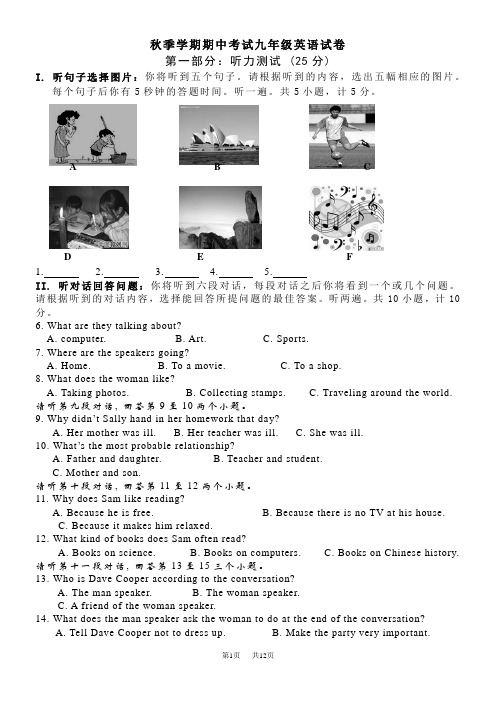
秋季学期期中考试九年级英语试卷第一部分:听力测试 (25分)I. 听句子选择图片:你将听到五个句子。
请根据听到的内容,选出五幅相应的图片。
每个句子后你有5秒钟的答题时间。
听一遍。
共5小题,计5分。
A B CD E F1. 2. 3. 4. 5.II. 听对话回答问题:你将听到六段对话,每段对话之后你将看到一个或几个问题。
请根据听到的对话内容,选择能回答所提问题的最佳答案。
听两遍。
共10小题,计10分。
6. What are they talking about?A. computer.B. Art.C. Sports.7. Where are the speakers going?A. Home.B. To a movie.C. To a shop.8. What does the woman like?A. Taking photos.B. Collecting stamps.C. Traveling around the world. 请听第九段对话, 回答第9至10两个小题。
9. Why didn’t Sally hand in her homework that day?A. Her mother was ill.B. Her teacher was ill.C. She was ill.10. What’s the most probable relationship?A. Father and daughter.B. Teacher and student.C. Mother and son.请听第十段对话, 回答第11至12两个小题。
11. Why does Sam like reading?A. Because he is free.B. Because there is no TV at his house.C. Because it makes him relaxed.12. What kind of books does Sam often read?A. Books on science.B. Books on computers.C. Books on Chinese history.请听第十一段对话, 回答第13至15三个小题。
(完整版)人教版九年级英语上册期中考试试题及答案
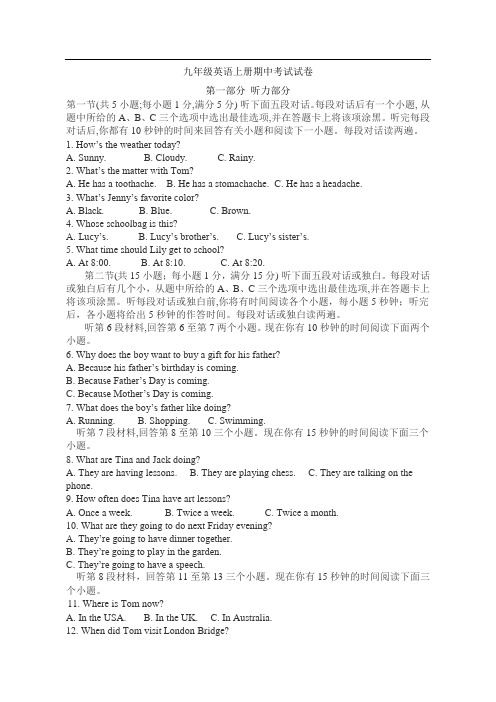
九年级英语上册期中考试试卷第一部分听力部分第一节(共5 小题;每小题1分,满分5分) 听下面五段对话。
每段对话后有一个小题, 从题中所给的A、B、C三个选项中选出最佳选项,并在答题卡上将该项涂黑。
听完每段对话后,你都有10秒钟的时间来回答有关小题和阅读下一小题。
每段对话读两遍。
1. How’s the weather today?A. Sunny.B. Cloudy.C. Rainy.2. What’s the matter with Tom?A. He has a toothache.B. He has a stomachache.C. He has a headache.3. What’s Jenny’s favorite color?A. Black.B. Blue.C. Brown.4. Whose schoolbag is this?A. Lucy’s.B. Lucy’s brother’s.C. Lucy’s sister’s.5. What time should Lily get to school?A. At 8:00.B. At 8:10.C. At 8:20.第二节(共15小题;每小题1分,满分15分) 听下面五段对话或独白。
每段对话或独白后有几个小,从题中所给的A、B、C 三个选项中选出最佳选项,并在答题卡上将该项涂黑。
听每段对话或独白前,你将有时间阅读各个小题,每小题5秒钟;听完后,各小题将给出5秒钟的作答时间。
每段对话或独白读两遍。
听第6 段材料,回答第6 至第7 两个小题。
现在你有10 秒钟的时间阅读下面两个小题。
6. Why does the boy want to buy a gift for his father?A. Because his father’s birthday is coming.B. Because Father’s Day is coming.C. Because Mother’s Day is coming.7. What does the boy’s father like doing?A. Running.B. Shopping.C. Swimming.听第7 段材料,回答第8 至第10 三个小题。
2023-2024学年全国初中九年级上英语人教版期中考试试卷(含答案解析)
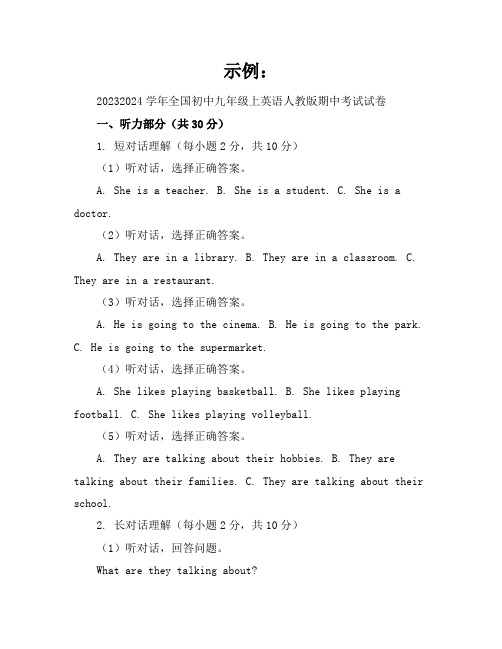
示例:20232024学年全国初中九年级上英语人教版期中考试试卷一、听力部分(共30分)1. 短对话理解(每小题2分,共10分)(1)听对话,选择正确答案。
A. She is a teacher.B. She is a student.C. She is a doctor.(2)听对话,选择正确答案。
A. They are in a library.B. They are in a classroom.C. They are in a restaurant.(3)听对话,选择正确答案。
A. He is going to the cinema.B. He is going to the park.C. He is going to the supermarket.(4)听对话,选择正确答案。
A. She likes playing basketball.B. She likes playing football.C. She likes playing volleyball.(5)听对话,选择正确答案。
A. They are talking about their hobbies.B. They are talking about their families.C. They are talking about their school.2. 长对话理解(每小题2分,共10分)(1)听对话,回答问题。
What are they talking about?(2)听对话,回答问题。
Where are they going?(3)听对话,回答问题。
Why are they going there?(4)听对话,回答问题。
How are they going there?(5)听对话,回答问题。
What are they planning to do there?二、阅读理解部分(共40分)1. 阅读短文,回答问题(每小题2分,共10分)(1)阅读短文,回答问题。
人教版英语九上期中综合测试题听力材料和参考答案

初中英语学习材料madeofjingetieji九年级上册期中综合测试听力部分材料Ⅰ. 听句子。
请根据听到的内容,选出相应的图片。
听一遍。
1. We are going to Yellow Mountain tomorrow.2. My watch says ten past four. Let’s play football.3. I think the Sydney Opera House is one of the best places in the world.4. John often helps his mother do chores.5. My hometown was too poor to have lights ten years ago.II. 听短对话。
选择正确的答案。
每段材料听两遍。
6. W: Did you know that the oldest painting on silk in the world was found in Hunan Province?M: Really?Question. What are they talking about?7. W: Where’s Paul? Isn’t he coming to the shop with us?M: Oh, he had to stay behind after school again for not doing his homework。
Question. Where are the speakers going?8. M: What’s your hobby, Ann?W: I collect stamps from all over the world.Question. What does the woman like?Ⅲ. 听长对话。
选择正确的答案。
每段材料听两遍。
听第1段材料, 回答第9至10小题。
- 1、下载文档前请自行甄别文档内容的完整性,平台不提供额外的编辑、内容补充、找答案等附加服务。
- 2、"仅部分预览"的文档,不可在线预览部分如存在完整性等问题,可反馈申请退款(可完整预览的文档不适用该条件!)。
- 3、如文档侵犯您的权益,请联系客服反馈,我们会尽快为您处理(人工客服工作时间:9:00-18:30)。
梁子湖区2020年秋期中质量监测九年级英语温馨提示:1、试卷共四个部分、七大题。
考试时间120分钟,满分120分。
2、听力与选择题的答案,用2B铅笔在答题卡上指定位置将答案标号涂黑。
如需改动,用橡皮擦干净后,再选涂其它答案标号。
答在试卷上无效。
3、非选择题的答案(含56—65小题)用黑色中性笔直接在答题卡上作答。
第一部分听力测试Ⅰ. 听力测试(共三节,20小题,满分25分)第一节: 听对话或描述,选图画。
听下面三段对话和两段描述。
从A、B、C 三幅图选出正确的一幅。
每段材料仅读一遍。
(每小题1分,共5分)1. 2. 3. 4. 5.A B C A B C A B C A B C A B C英语试卷第 1 页(共12 页)第二节:听对话,选答案。
听下面4段对话,根据对话内容,从A、B、C三个选项中选出最适当的答案。
每段对话读两遍。
(每小题1分,共10分)听第6段材料,完成6—7小题。
6. Where is Daisy at the moment?A. In the school.B. On a bus.C. At a bus stop.7. How might Daisy go home?A. By taxi.B. By car.C. On foot.听第7段材料,完成8—10小题。
8. Where was the camera made?A. In America.B. In Japan.C. In Africa.9. What present did Thomas give Steve?A. A video.B. A book.C. A sweater.10. What does t he man think of Amy’s present?A. Expensive.B. Lovely.C. Disappointing.听第8段材料,完成11—12小题。
11. Where did Roy work?A. At a university.B. At a bank.C. At a police station.12. How did the woman know Roy?A. They were neighbors.B. They went to the same school.C. They used to play tennis together.听第9段材料,完成13—15小题。
13. What was wrong with Jim?A. He had a cold.B. He had a headache.C. He had a temperature.14. How long has Jim been ill?A. About two days.B. About four days.C. About a week.15. What did the doctor tell Jim to do?A. To take more exercise.B. To take some medicine.C. To take a walk every day.第三节:听短文,选答案。
听下面一篇短文,根据短文内容,从A、B、C三个选项中选出正确选项。
短文读两遍。
(每小题2分,共10分)16. Who really invented the first car?A. A German.B. An American.C. An Englishman.17. When was the first car invented?A. More than 100 years ago.B. Less than 100 years ago.C. Just 100 years ago.18. How many brothers and sisters did Ford have?A. Five brothers and sisters.B. Six brothers and sisters.C. Seven brothers and sisters.19. What company did Ford found later?A. The Ford Watch Company.B. The Ford Motor Company.C.The Ford Repair Company.20.What can we learn from the monologue?A. Young Ford repaired watches in the evenings for fun.B. Clever Ford invented cars without any difficulties.C. It was the hard life that made Ford strong and able.英语试卷第 2 页(共12 页)第二部分语言知识运用II. 单项选择(共15小题,每小题1分,满分15分)从A、B、C、D四个选项中,选出可填入空白处的最佳选项。
21. —In China, we use red paper for hongbao because red means good luck.—That’s interesting! I want to know all the Chinese▲.A. traditionsB. sentencesC. noticesD. problems22. —A nice day today, isn’t it?—Yes. ▲go for a picnic and relax ourselves?A. Would you likeB. Why notC. What aboutD. Why don’t23. —He hardly worries about his English, ▲he?—▲. He always keeps his worries to himself.A. doesn’t; YesB. does; NoC. does; YesD. doesn’t; No24. —Molly has changed so much! She ▲be shy and quiet.—Yeah. But now she ▲speaking in front of class.A. is used to; is used toB. used to; is used toC. used to; used toD. is used to; used to25. —Do you know ▲to see the Beijing Opera?—Yes, you can go to Dongfang Theatre.A.where can we goB. where we can goC. when shall we goD.when we shall go26. —Do you know why the teacher ▲Bill yesterday?—Because he had a fight with his classmate.A. praisedB. sentC. metD. punished27. —Were you at home at 9 o’clock last night?—Yes, I ▲ a shower at that time.A. tookB. was takingC. have takenD. am taking28. — Is everyone here today?— No, Lucy is at home ▲she has got a high fever.A. becauseB. ifC. untilD. unless29. —What do you think of the new movie Wandering Earth《流浪地球》?—It’s▲wonderful ▲I really like it.A. too; toB. such; thatC. so; thatD. enough; to30. — Who is the boy in the picture?—Ha ha! It’s me! The picture ▲ten years ago.A. takesB. tookC. is takenD. was taken31. —Which of the two T-shirts will you take?—I’ll take▲. One is for my brother and the other is for myself.A. eitherB. bothC. neitherD. all32. — We ▲the National Forest Park next Sunday. Would you like to join us?— Sure!英语试卷第 3 页(共12 页)A. visitB. visitsC. will visitD. visited33. — Could you tell me ▲you’d like me to pay you?—You’d better use mobile payment. I don’t care▲it is Ali Pay or WeChat Pay.A. how, whetherB. how, whyC. what, whetherD. what, why34. —Does my question sound ▲enough?—I don’t think so. You can ask more ▲by using “could” instead of “can”.A. polite; politelyB. politely; politeC. politely; politelyD. polite; polite35. —Why are you standing there, Jack?—Two tall boys are sitting ▲me, so I can’t see the blackboard cl early.A. behindB. next toC. in front ofD. besideIII. 完形填空(共10小题,每小题1分,满分10分)The teacher sent me home with a note for my mother that said I needed to visit the eye doctor because I failed the vision test. The trip home that day was very slow.My mother said it would all be just fine. “It wouldn’t hurt a bit,” she said. But I wasn’t worried about pain-I was worried about looking 36 .The next day, my mother pulled me to the eye doctor’s office. I 37 a set of frames (镜框) and tried to believe my mother when she said they looked really 38 on me. The doctor said the glasses would be ready soon. But I wasn’t ready at all, and I didn’t think I ever would be.When the glasses arrived, the eye doctor put them on my face and walked me out onto the sidewalk in front of his office. When I looked 39 from my shoes, I found myself in a whole new world – a world filled with 40 pictures, bright colors, and fine detail everywhere I looked. Suddenly I 41 the beautiful outline of red leaves on trees. I could see the details of people’s faces long before they were standing in front of me. I could see my mother 42 as she watched me see the world in a whole new way.“Glasses aren’t so bad, are they?” Mom asked.“Not at all, “ I thought to myself. On that first day, they were a 43 .The Monday morning came, and I had to 44 the kids in my classroom. And it happened, just like I feared it would be. A mean kid pointed at me in the middle of the maths class and shouted, “Four 45 !” But at the same moment, looking through my new glasses, I could see all the way across the room that the kid who had said it had an awfully big nose.36.A. smart B. old C. funny D. blind37.A. chose B. made C. fixed D. owned38.A. silly B. good C. huge D. strange39.A. around B. back C. down D. up40.A. pale B. dark C. clever D. rare41.A. noticed B. recorded C. developed D. imagined42.A. crying B. worrying C. dreaming D. smiling43.A. present B. wonder C. beauty D. fashion44.A .impress B. visit C. face D. avoid英语试卷第 4 页(共12 页)45.A. noses B. eyes C. glasses D. frames第三部分阅读理解IV.阅读理解(共20小题,每小题2分,满分40分)阅读下面四篇材料,根据其内容,选择正确答案或完成阅读任务。
